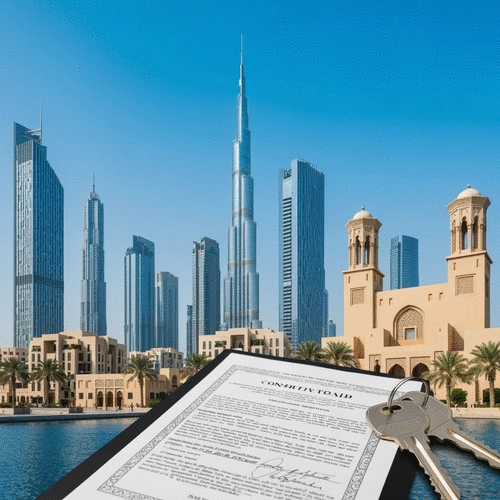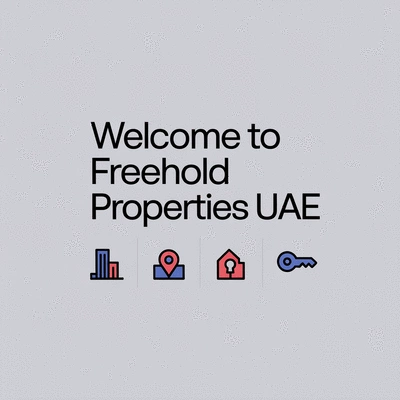When navigating the complexities of the UAE property market, understanding the essentials is crucial. Did you know that the type of property you choose can significantly impact your investment returns and lifestyle? In a landscape where both freehold and leasehold options exist, buyers must be equipped with the right knowledge to make informed decisions.
What You Will Learn
- Freehold properties provide full ownership of both the property and land, granting greater control and flexibility.
- Leasehold properties offer ownership for a specified period, typically 99 years, after which ownership reverts to the landowner.
- Understanding key terminology, such as title deeds and property registration, is essential for navigating the real estate market effectively.
- Financial considerations vary significantly between freehold and leasehold properties, including initial costs and long-term appreciation potential.
- Recognizing the pros and cons of freehold versus leasehold can help align your property choice with your lifestyle and investment goals.
- Consulting with real estate professionals can provide market insights, negotiation skills, and legal guidance to ease the buying process.
- Being aware of your rights as a tenant or landlord enhances your experience and facilitates better property management.
Freehold vs. Leasehold Properties in the UAE: A Comparison
This visual highlights the key distinctions between freehold and leasehold properties in the UAE, covering ownership, financial aspects, and investment potential.
Freehold Properties
Ownership:
Own both property and land indefinitely.
Control & Flexibility:
Complete autonomy (renovate, sell, rent at discretion).
Initial Costs:
Generally higher (property price, registration, land fees).
Appreciation Potential:
Typically appreciate more over time, better ROI.
Resale Value:
Higher resale value.
Leasehold Properties
Ownership:
Ownership for a specified period (e.g., 99 years).
Control & Flexibility:
Restrictions on modifications without landowner's consent.
Initial Costs:
Often lower (lease cost, registration, landowner fees).
Appreciation Potential:
Limited appreciation, tied to lease duration.
Resale Value:
Lower resale value, especially as lease nears end.
Understanding Property Ownership in the UAE: Freehold vs Leasehold
When it comes to navigating the real estate market in the UAE, understanding the differences between freehold and leasehold properties is essential. As someone who has spent over a decade in this dynamic market, I’ve seen how crucial it is for buyers—whether local or international—to grasp these concepts. Freehold properties allow for full ownership, while leasehold properties come with certain limitations. Let's break these down!
In freehold arrangements, you own the property and the land it stands on, providing you with complete control and flexibility. On the other hand, leasehold properties offer ownership for a specified period—typically 99 years—after which ownership reverts back to the landowner. Understanding these fundamental differences can significantly influence your property investment decisions in the UAE.
Defining Freehold and Leasehold Properties
So, what exactly do we mean by freehold and leasehold? Here’s a quick overview:
- Freehold Properties: You own both the property and the land indefinitely. For a deeper understanding of the concepts of freehold and leasehold, you can refer to resources like the UK government's technical notes on leasehold dwellings.
- Leasehold Properties: You have ownership rights over the property for a limited time, but not the land. This type of ownership is detailed further in guides like the Leasehold and Freehold Reform Bill Guide.
These definitions set the stage for a deeper understanding of property rights and investment implications, which are particularly crucial for expatriates considering a purchase in this vibrant market.
Ownership Rights: What You Need to Know
The ownership rights associated with freehold and leasehold properties differ significantly. With freehold ownership, you enjoy complete autonomy over your property. You can renovate, sell, or rent it out at your discretion. Conversely, leasehold ownership often comes with restrictions that can limit your ability to modify the property without the landowner's consent. For more information on the ongoing reforms and distinctions, the Economics Observatory provides insights into UK land and property, including freehold and leasehold reforms.
Here’s a summary of key ownership rights:
- Control: Freehold owners have the ultimate say in property decisions.
- Restrictions: Leaseholders may face limitations on renovations or alterations.
Grasping these differences ensures you make informed choices that align with your lifestyle and investment goals.
Freehold vs Leasehold: Key Terminology Explained
To navigate property ownership in the UAE effectively, it's vital to understand certain terms:
- Title Deeds: Official documents that prove ownership of a property.
- Property Registration: The process of recording your ownership with the local authorities.
- Emiri Decrees: Government regulations that dictate property laws and ownership rights.
Familiarizing yourself with these terms will empower you as a buyer, enabling you to approach the market with confidence and clarity.
Financial Considerations: Costs and Affordability
When considering property purchases in the UAE, understanding the financial aspects is just as crucial as grasping ownership structures. From initial costs to long-term implications, each property type comes with its own set of financial considerations.
Buyers must evaluate not just the price of the property but also the associated costs like registration fees, taxes, and maintenance charges. Let's take a closer look at what you can expect!
Initial Costs of Freehold vs Leasehold Properties
The initial costs for purchasing freehold and leasehold properties can vary considerably. Generally, freehold properties may have higher upfront costs due to greater ownership rights. Here’s a breakdown:
- Freehold Costs: Include property price, registration fees, and potential land fees.
- Leasehold Costs: Often cover the cost of the lease, registration, and sometimes additional fees for the land owner.
Understanding these costs can help you budget effectively and determine which option aligns with your financial strategy.
Long-Term Financial Implications
Looking beyond the initial purchase, the long-term financial implications differ significantly between freehold and leasehold properties. Freehold properties typically appreciate more over time, providing better returns on investment. In contrast, leasehold properties may have limited appreciation potential, often tied to the lease duration and market conditions.
Key considerations include:
- Appreciation Potential: Freehold properties generally appreciate more over time.
- Resale Value: Freehold tends to have a higher resale value compared to leasehold.
By evaluating these aspects, you can make a more informed investment decision tailored to your financial goals.
Understanding Property Taxes and Service Charges in the UAE
Another vital aspect of property ownership in the UAE involves understanding the various taxes and service charges that apply to both freehold and leasehold properties. These charges can directly impact your overall budget and should be factored into your financial planning.
- Service Charges: Regular fees for the upkeep of common areas and facilities.
- Property Taxes: Applicable rates that may differ based on property type and location.
Being aware of these potential expenses will allow you to manage your finances efficiently and avoid unexpected surprises down the road.
Pro Tip
When considering whether to invest in a freehold or leasehold property, always factor in the long-term implications on your lifestyle and financial goals. Freehold properties typically offer better appreciation potential and flexibility, while leasehold options might provide a more affordable entry point into the market. Analyze your personal situation and investment strategy to make the best choice for your future.
Frequently Asked Questions (FAQs)
Making an Informed Decision: What Buyers Should Consider
Deciding between freehold and leasehold properties can feel overwhelming, but it doesn't have to be! By weighing the pros and cons of each option, you can make a choice that aligns with your lifestyle and investment goals. Let’s break down the key advantages and disadvantages of both property types.
Weighing the Pros and Cons of Freehold and Leasehold
Understanding the nuances between freehold and leasehold properties is essential for any buyer. Here’s a quick comparison to help you assess your priorities:
- Freehold Properties: Full ownership of the property and land, providing greater control over modifications and potential rental income.
- Leasehold Properties: Ownership of the property for a fixed term, usually with restrictions on modifications and a lesser degree of control.
- Investment Potential: Freehold properties often appreciate faster, but leasehold can be a more affordable entry point into the market.
- Responsibility: Freehold owners are responsible for maintenance and management, while leaseholders may have some obligations covered by the landlord.
As you can see, each property type has distinct characteristics. If you're looking for a long-term investment and the ability to make modifications, freehold might be the way to go. However, if affordability and less responsibility are your priorities, leasehold could be a suitable option.
Final Thoughts on Choosing Between Freehold and Leasehold
When it comes to making your decision, it’s crucial to reflect on your personal circumstances. Ask yourself: What are my financial goals? How long do I plan to stay in the UAE? Understanding your *long-term plans* will help you evaluate which property type aligns with your aspirations.
If you're still feeling uncertain, don’t worry! The team at Freehold Properties UAE is here to help you navigate through your options. We specialize in understanding the unique needs of buyers like you, so you can feel confident in your decision-making process.
Engage with Experts: Getting Professional Advice
Consulting with real estate professionals can significantly ease the complexities of property ownership in the UAE. It’s vital to have guidance from those who understand the local market and regulations.
Consulting Real Estate Professionals in the UAE
Whether you’re a first-time buyer or an experienced investor, seeking expert advice is invaluable. Here are a few benefits of working with professionals:
- Market Insights: Professionals can provide the latest information on market trends and property values.
- Negotiation Skills: Experienced agents can help you secure the best deal and navigate the offer process.
- Legal Guidance: Legal advisors ensure that all your paperwork is in order, safeguarding your interests.
Having a team of experts by your side can make the buying process smoother and more rewarding. Don’t hesitate to reach out to us at Freehold Properties UAE for personalized assistance tailored to your specific needs!
Understanding Your Rights as a Tenant and Landlord
It’s also essential to understand the rights and responsibilities that come with property ownership, whether you’re a tenant or a landlord. Here’s what you need to know:
- Tenant Rights: Tenants have the right to live peacefully in the property and have access to necessary repairs.
- Landlord Responsibilities: Landlords must maintain the property in a habitable condition and respond promptly to repair requests.
- Lease Agreements: Ensure you review any lease agreement carefully to understand your rights and obligations clearly.
Being informed about these rights can enhance your overall experience, whether you're renting or owning a property.
Join the Conversation: Share Your Experiences
At Freehold Properties UAE, we believe in the power of community and shared knowledge. Have you had experiences with freehold or leasehold properties? We’d love to hear your stories, questions, or insights!
Engage with us in the comments or reach out directly. Your perspective can help others who are on the same journey, making the real estate market a more transparent and supportive space for everyone. Let’s grow together!
Recap of Key Points
Here is a quick recap of the important points discussed in the article:
- Freehold Properties: Offer full ownership of both the property and the land, allowing greater control and flexibility.
- Leasehold Properties: Provide ownership for a specified period (typically 99 years), with certain limitations on modifications.
- Ownership Rights: Freehold owners have complete control over their property, while leaseholders may face restrictions.
- Financial Considerations: Understand initial costs, long-term implications, and additional expenses like taxes and service charges.
- Professional Guidance: Consulting real estate professionals can provide valuable insights and legal assistance, making the buying process smoother.









